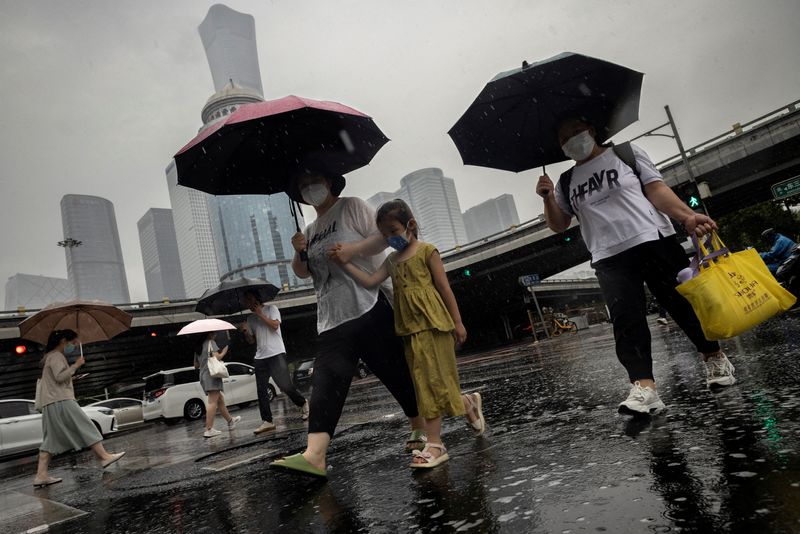(Reuters) - Global firms from consumer goods giant Unilever (NYSE:UL) to automaker Nissan (OTC:NSANY) and machinery maker Caterpillar (NYSE:CAT) have warned of slowing earnings in China as the world's second-largest economy loses its post-pandemic bounce.
The rebound has been limited to a handful of sectors such as travel, dining and luxury goods, driving double-digit China sales growth for the likes of Starbucks (NASDAQ:SBUX), LVMH and Hugo Boss. But many of those bellwethers have stopped short of raising their China outlook, wary of lackluster economic figures.
Consumer goods firms such as Procter & Gamble (NYSE:PG), L'Oreal and Coca-Cola (NYSE:KO) have taken a cautious stance.
"What we're seeing is a very cautious consumer in China, a declining property market and reduced export demand," Unilever finance chief Graeme Pitkethly told an April-June earnings call last week.
"There is high unemployment in China, particularly youth unemployment ... As much as we can tell, we're at the historical low point in terms of Chinese consumer confidence."
Beijing has rolled out a series of policy measures in recent weeks to shore up the flagging economy, but weak manufacturing data for July on Tuesday shows it is still far from turning a corner.
That is a particular blow for major European exporters to China, which are already struggling with persistent global price pressures and rising borrowing costs.
Ireland-based Kerry Group, which supplies ingredients to companies like McDonald's (NYSE:MCD), said its volumes had increased in China since COVID restrictions ended.
But chief executive Edmond Scanlon cautioned on Wednesday that business would not get back to normal there until 2024.
"Any (stimulus) announcements out of China are more likely to put a floor under growth rather than restimulate growth," said Jack Janasiewicz, portfolio manager at Natixis in Boston. "It’s not overly surprising that you’re starting to see some of that filter into the earnings backdrop."
Global automakers are having to contend with increased competition from rivals in China, which for the first time took a more than 50% share of the Chinese market in the first half of 2023. Volkswagen (ETR:VOWG_p) cut its full-year sales target last week after sales dipped in China, its top market.
"Unfortunately, our (China) sales outlook is now falling far below our production capacity," Nissan CEO Makoto Uchida said last week. Earnings recovery in the world's biggest auto market is likely to take time, he said.
Expectations for second-quarter earnings are already low due in part to China's weakness. Refinitiv I/B/E/S data show U.S. and European companies are expected to report their worst quarterly results in years.
The short-lived bounce in economic activity after China lifted its long COVID lockdowns also highlights poor global demand, DHL Group, one of the world's biggest shippers, said on Tuesday.
The company saw drops of 16% and 7.1% respectively in air and ocean freight volumes in the first half, particularly on routes between China and its two biggest trading partners, the United States and Europe.
FALLING SHORT
Chipmakers such as Samsung (KS:005930) and SK Hynix said China's reopening had failed to spark a revival in the smartphone market, and that they were extending production cuts of NAND memory chips used in handsets to store data.
Even Apple (NASDAQ:AAPL), the world's most valuable company, is likely to post flat iPhone sales in its third-largest market when it reports results Thursday. Still, that would be an improvement from the 2.1% contraction researcher IDC estimated for China's overall smartphone market in April-June.
Top miners and heavy machinery makers have also taken a hit from a prolonged property sector slump.
"We expected sales in China to be below the typical 5% to 10% of our enterprise sales. We now expect further weakness as the 10-ton-and-above excavator industry has declined even more than we anticipated," Caterpillar CEO Jim Umpleby told an earnings call on Tuesday.
Rio Tinto (NYSE:RIO), the world's biggest iron ore producer, is cautiously optimistic on China as the government has pledged more policies to boost growth.
"Our experience with China is that if things are going less well, then the Chinese have a quite impressive ability to also manage the economy," Rio Tinto CEO Jacob Stausholm said after reporting earnings last week.
BRIGHT SPOTS
Eateries, hotels, and luxury goods makers have been among few bright spots as Chinese consumers splurge following the lifting of COVID-19 restrictions on movement.
Starbucks reported a 46% surge in comparable China sales last quarter. "We'd say we expect our recovery to sustain in China," Starbucks CFO Rachel Ruggeri told investors on Tuesday.
Yum China, owner of the KFC and Pizza Hut chains in mainland China, reported a 25% rise in quarterly revenue, but said spending per person had decreased as consumers become more "rational" in their outlay.
Hotel operators Hilton and Marriott both saw a rebound, with Marriott saying Tuesday that quarterly room revenue in China rose 125% from a year ago. “The recovery in China has come faster than we expected,” Marriott CFO Kathleen Oberg told investors.
LVMH, whose 75 brands include Louis Vuitton and U.S. jeweller Tiffany, reported a better-than-expected 17% rise in global second-quarter sales due to rebound in China, but refrained from giving an outlook for the rest of the year.

"The global mood is not one of 'revenge buying' like we saw in 2021 and 2022," LVMH finance chief Jean-Jacques Guiony said last week. "We have no visibility, (but) we are not pessimistic and don't have a reason to be (pessimistic) in China."
(This story has been corrected to change the day to Tuesday in paragraph 25)